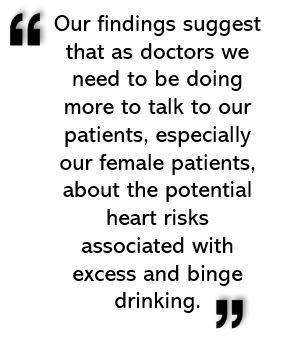- Clinical Technology
- Adult Immunization
- Hepatology
- Pediatric Immunization
- Screening
- Psychiatry
- Allergy
- Women's Health
- Cardiology
- Pediatrics
- Dermatology
- Endocrinology
- Pain Management
- Gastroenterology
- Infectious Disease
- Obesity Medicine
- Rheumatology
- Nephrology
- Neurology
- Pulmonology
Risk for CHD Double Among Women who Binge Drink vs Men
ACC.24: Even modest alcohol intake increases risk for coronary heart disease in men and women but women are at much greater risk across levels of weekly consumption.
Young to middle-aged women who reported drinking 8 or more alcoholic beverages per week, ie, more than 1 per day, on average, were between 33% and 51% more likely to develop coronary heart disease (CHD) compared with those who drank less, according to findings from Kaiser Permanente research presented at the 2024 American College of Cardiology Scientific Sessions last week in Georgia.1
©Jacob Lund/stock.adobe.com

The risk for CHD among both men and women was highest for study participants who reported heavy episodic or binge drinking. Women in this category, however, were more than 2-fold more likely than men (68% vs 33%) to develop heart disease than their respective contemporaries who reported moderate intake.2
“When it comes to binge drinking, both men and women with excess alcohol consumption had a higher risk of heart disease,” Jamal Rana, MD, PhD, FACC, a cardiologist with The Permanente Medical Group, adjunct investigator in the Division of Research at Kaiser Permanente Northern California and the study’s lead author, said in a press statement. “For women, we find consistently higher risk even without binge drinking.”2
The investigators note in the study abstract that the incidence of myocardial infarction and other forms of heart disease has risen alarmingly among younger adults in the US, driving concerns about declining health outcomes. At the same time, they add, alcohol use and binge drinking have become more common among women than in previous decades, both observations serving as a foundation for the current research.1
The study included 432 265 members of Kaiser Permanente Northern California (KPNC) aged 18 to 65 years who did not have a history of heart disease or stroke. The study population had a mean age of 44 years and was 43% women.1 All participants were asked about alcohol use during a primary care visit as part of KPNC’s standard “Alcohol as a Vital Sign” screening initiative, between 2014 and 2015.2 Rana and colleagues analyzed the relationship between level of alcohol intake and CHD diagnoses during a 4-year follow-up period based on inpatient ICD diagnoses of my myocardial infarction, coronary heart disease and stroke.1
Participant's overall alcohol intake was categorized, based on self-report, as1:
- low - 1-2 drinks/week for both men and women
- moderate - 3-14 drinks/week for men, 3-7 for women
- high - 15 or more drinks/week for men, 8 or more for women
Researchers further categorized participants as engaging or not engaging in binge drinking, defined as more than 4 drinks for men or more than 3 drinks for women in a single day in the past 3 months.1 No one who reported no drinking was included in the study. Using multivariable logistic analyses, Rana et al adjusted for race/ethnicity, body mass index, physical activity, smoking status (1 yr prior) and blood pressure.1
FINDINGS
Overall, 3108 study participants were diagnosed with CHD over the 4-year follow-up, with a linear relationship observed between heart disease and alcohol consumption.2 Women whose alcohol intake was in the high category had a 45% greater risk of CHD vs those who reported low intake; high consumers had a 29% greater risk compared with those who reported moderate intake.2 The difference, noted above, was greatest among binge drinkers of both sexes.1

Rana and colleagues found no significant difference in risk between people who reported moderate versus low alcohol intake, regardless of whether they also were categorized as binge drinking.2
“When it comes to heart disease, the number one thing that comes to mind is smoking, and we do not think about alcohol as one of the vital signs. I think a lot more awareness is needed, and alcohol should be part of routine health assessments moving forward,” Rana said.2 Further “Our findings suggest that as doctors we need to be doing more to talk to our patients — especially our female patients — about the potential heart risks associated with excess and binge drinking.”2
The findings were presented at the annual American Academy of Cardiology meeting as an abstract. The full study has been submitted to a medical journal but has not yet been peer reviewed or published.2
